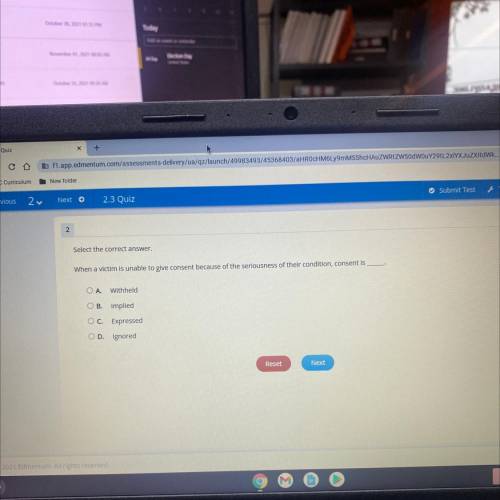
Health, 04.11.2021 03:30 jamarcuswilliam2515
When a victim is unable to give consent because of the seriousness of their condition, consent is
Ο Α.
Withheld
OB. Implied
OC. Expressed
OD Ignored


Answers: 3


Another question on Health

Health, 22.06.2019 15:20
[120 total points] (public health) in one of the largest human experiments ever conducted, in 1954 a randomized controlled trial was run to see whether a vaccine developed by a doctor named jonas salk was effective in preventing paralytic polio. a total of 401,974 children (ages 6–9), chosen to be representative of those who might be susceptible to the disease, were randomized to two groups: 200,745 children (the control group c) were injected with a harmless saline solution (a placebo) and the other 201,229 children (the treatment group t) were injected with salk’s vaccine.what was the point of giving saline solution to the children who didn’t get the vaccine? explain briefly.
Answers: 2

Health, 23.06.2019 05:00
A35-year-old woman arrives on the floor after an uneventful hysteroscopy to evaluate her long history of uterine fibroids. about 30 minutes after her arrival, she begins to complain of nausea and has two episodes of vomiting. the physical administers 0.625 mg of droperidol and 400 mg of acetaminophen by mouth. on follow-up evaluation, the patient's neck is involuntarily flexed to one side. she is alert, oriented, and conversation and has an otherwise normal neurological examination. which of the following is the most likely diagnosis? - cerebral vascular accident- conversion disorder- dystonic reaction to droperidol- munchausen syndrome- seizure
Answers: 3

Health, 23.06.2019 05:00
The parents of a 9-year-old girl bring their daughter to the ed. for the last 12 hours, the child has suffered severe nausea and vomiting, as well as diarrhoea and abdominal cramps. further discussion with the child indicates that she suffers from blurred vision and headache. the parents originally were worried about bringing the child to the ed because they feared deportation since the family are illegal immigrants employed to pick strawberries on a nearby farm. on direct questionning, the parents admit that the child was assisting with spraying crops with pesticides the previous day. none of the family members was wearing any protecting clothing. her bp is 88/48 mmhg, pulse is 90/min, rr 33/min, temp 38 c. the child appears sweaty and confused. auscultation of the lungs reveals a diffuse wheeze bilaterally. pupils are miotic and the child has diffuse muscle weakness. which of the following interventions is the most appropriate treatment? - atropine- charcoal- glucagon- naloxone- exposure: consider organophosphate poisoning, which inhibits cholinesterase and results in accumulation of ach in both muscarinic and nicotinic sites. pralidoxime activates achatropine competes with ach only at muscarinic receptors, but will not reverse nicotinic effectscharcoal = gastric decontaminationglucagon = reverse beta-blocker overdosenaloxone = reverse effects of opioids
Answers: 3

Health, 23.06.2019 11:10
You're in the breakroom at work when you see a coworker posting a cartoon on the bulletin board. you read it as you pass, and it's a joke about women breastfeeding in public. a male walks up, looks at it and starts laughing. other make employees walk up, and one takes it down saying he is going to make copies for everyone. what do you do?
Answers: 1
You know the right answer?
When a victim is unable to give consent because of the seriousness of their condition, consent is...
Questions



Chemistry, 24.07.2019 21:10



















